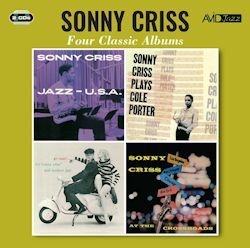CD1
1. Willow Weep For Me (Jazz USA)
2. These Foolish Things (Jazz USA)
3. Blue Friday (Jazz USA)
4. Sunday (Jazz USA)
5. More Than You Know (Jazz USA)
6. Easy Living (Jazz USA)
7. Alabamy Bound (Jazz USA)
8. Something's Gotta Give (Jazz USA)
9. West Coast Blues (Jazz USA)
10. Criss-Cross (Jazz USA)
11. Ham's Blues (Jazz USA)
12. Sweet Georgia Brown (Jazz USA)
13. I Love You (Plays Cole Porter)
14. Anything Goes (Plays Cole Porter)
15. Easy To Love (Plays Cole Porter)
16. It's Alright With Me (Plays Cole Porter)
17. In The Still Of The Night (Plays Cole Porter)
18. Love For Sale (Plays Cole Porter)
19. Night And Day (Plays Cole Porter)
20. Just One Of Those Things (Plays Cole Porter)
21. What Is This Thing Called Love (Plays Cole Porter)
22. I Get A Kick Out Of You (Plays Cole Porter)
CD2
1. Summertime (Go Man!)
2. Memories Of You (Go Man!)
3. Wailin' With Joe (Go Man!)
4. How Deep Is The Ocean (Go Man!)
5. The Blues For Rose (Go Man!)
6. The Man I Love (Go Man!)
7. Until The Real Thing Comes Along (Go Man!)
8. Blue Prelude (Go Man!)
9. After You've Gone (Go Man!)
10. Come Rain Or Come Shine (Go Man!)
11. How High The Moon (Go Man!)
12. If I Had You (Go Man!)
13. Sweet Lorraine (At The Crossroads)
14. You Don't Know (At The Crossroads)
15. I Got It Bad (At The Crossroads)
16. Sylvia (At The Crossroads)
17. Softly (At The Crossroads)
18. Butts Delight (At The Crossroads)
19. Indiana (At The Crossroads)
Hardly a forgotten man, Sonny Criss however still tends to be underestimated. His deft, blues-drenched playing, so crisply articulate, so incisively
poised, is often taken for granted in these 1956-c.1959 tracks, largely recorded in LA – At the Crossroads was taped in Chicago. Both he and Phil
Woods have always tended to be saddled with the ‘Parker acolyte’ epithet but when they play as well as they do such perceived stylistic limitations become
positive strengths.
When you have Kenny Drew and Barney Kessel in your tight band, as in Jazz USA, few things can go wrong. Drew’s drifting harmonies in These Foolish Things are a boon, as is the fluidity of Criss’ soloing on this date at even the fastest tempo – try the jump style vitesse
of Alabamy Bound, which means to get there in a hurry. In this set originals by Criss, and one by Kessel, are surrounded by standards. In the Cole
Porter album he has ten ready-made vehicles for his own magisterially efficient mechanism to play on the chords. The personnel is completely different with
Sonny Clark and on four tracks less well-known Jimmy Bunn replacing Drew, Larry Bunker’s vibes lending interesting sonic colour and a sprightly bass and
drum combo of Buddy Woodson (or on some tracks Teddy Smith) and Lawrence Marable. The stand-out track here – in a number where his vibrato sounds slightly
thicker than in the previous LP – is What Is This Thing Called Love, which seems to inspire his improvisational juices rather more than the other
numbers, however finely he plays there.
Go Man!
which opens the second disc was largely recorded a few days before the Porter disc. Clark and Marable are joined by Leroy Vinnegar for a straight-ahead
quartet session. There are 12 tight tracks here, none much exceeding the four-minute mark. Without much time to stretch out the music is tautly delivered,
concise and very much to the point. Variation in tempo ensures things never become too becalmed but listening straight through does leave the thought that
there was something just a little unrelieved and remorseless about Criss’s playing in such circumstances. It’s when he evokes a consummate balladeer like
Johnny Hodges – which he does occasionally, as on If I had You - that a new dimension is added to the music.
At the Crossroads
is the final LP and there seems to be a little uncertainty about the year – whether 1959 or a year earlier. Whichever, Wynton Kelly is the pianist – Criss
had expensive tastes in keyboard collaborators – and Ole Hansen, a somewhat unusual choice perhaps, is the trombone front-line partner. He plays a mean
blues line and their unisons and solos offer an engaging slant. Some of these tracks stretch out more than was allowed in the other three LPs, which is all
to the good, as the rhythm relaxes and the soloing has a more flexible current. It’s a shame Kelly’s piano is so dodgy-sounding.
A somewhat mixed feeling then about Criss in these LP transfers. Much is excellent whilst some inclines to the effortlessly bland. Still, with full
personnel details, reprinted liner notes and good transfers this excellently priced twofer adds to Avid’s stable of desirable releases.
Jonathan Woolf
